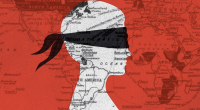 Ignoring the central role of race and colonialism in world affairs precludes an accurate understanding of the modern state system.
Worldwide protests against police racism and brutality and the toppling of statues commemorating white supremacists have led to a public reckoning in the United States and many other countries—forcing citizens and governments to confront the historical legacy of systemic racism and the enduring inequalities it has created.
Ignoring the central role of race and colonialism in world affairs precludes an accurate understanding of the modern state system.
Worldwide protests against police racism and brutality and the toppling of statues commemorating white supremacists have led to a public reckoning in the United States and many other countries—forcing citizens and governments to confront the historical legacy of systemic racism and the enduring inequalities it has created.
Games Without Borders
16.02.2021 | by Gurminder K. Bhambra, Yolande Bouka , Randolph B. Persaud, Olivia U. Rutazibwa, Vineet Thakur, Duncan Bell, Karen Smith, Toni Haastrup and Seifudein Adem
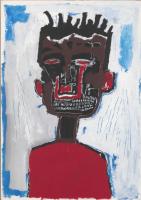 Jean-Michel Basquiat wasn’t a fan of interviews, and on the rare occasions he surrendered to them, his responses were terse—even cryptic. Despite this, the painter’s words reveal a great deal about his inspirations and his all-consuming process. They offer a window into his approach, in which he remixed references from art history, the streets of 1980s New York, and the tumult of pop culture with his Carribean heritage and his identity as a young black man.
Jean-Michel Basquiat wasn’t a fan of interviews, and on the rare occasions he surrendered to them, his responses were terse—even cryptic. Despite this, the painter’s words reveal a great deal about his inspirations and his all-consuming process. They offer a window into his approach, in which he remixed references from art history, the streets of 1980s New York, and the tumult of pop culture with his Carribean heritage and his identity as a young black man.
Stages
08.02.2021 | by Alexxa Gotthardt
 Lovers rock helped to change perceptions of black music in the British media. Despite its transnational origin, it is considered a distinctly British genre, the first post-colonial music genre to emerge in the UK, before other internationally known genres such as Brit Funk, Acid House, Jungle, UK garage, Dubstep, Grime, or UK drill came about.
Lovers rock helped to change perceptions of black music in the British media. Despite its transnational origin, it is considered a distinctly British genre, the first post-colonial music genre to emerge in the UK, before other internationally known genres such as Brit Funk, Acid House, Jungle, UK garage, Dubstep, Grime, or UK drill came about.
Afroscreen
07.02.2021 | by Marcos Cardão
 Black historic and political figures have been rendered as vanquishing heroes as well. Noble, brave and transcendent, they have remarkable stories. We tremble in awe before the recounting of Frederick Douglass escaping from slavery and Ida B. Wells narrowly evading the Klan in Memphis, saving her own life — then, through her investigative journalism into the practice of lynching, saving the lives of countless others. Martin Luther King Jr., who survived threats, bombs and jail cells before falling to an assassin’s bullets, has been rendered as the ultimate hero. His depiction is messianic. And though he was a key member of a vast and complex movement, he is often presented as singular. This is the way we tell history in the American public sphere.
Black historic and political figures have been rendered as vanquishing heroes as well. Noble, brave and transcendent, they have remarkable stories. We tremble in awe before the recounting of Frederick Douglass escaping from slavery and Ida B. Wells narrowly evading the Klan in Memphis, saving her own life — then, through her investigative journalism into the practice of lynching, saving the lives of countless others. Martin Luther King Jr., who survived threats, bombs and jail cells before falling to an assassin’s bullets, has been rendered as the ultimate hero. His depiction is messianic. And though he was a key member of a vast and complex movement, he is often presented as singular. This is the way we tell history in the American public sphere.
To read
05.02.2021 | by Imani Perry
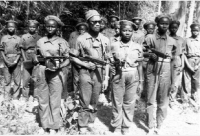 It is February 1964—one year into the armed struggle for independence in Guinea Bissau against Portuguese colonial rule. Cabral, the independence struggle’s leader, had called a conference in Cassaca for his African Party for the Independence of Guinea and Cape Verde (PAIGC) fighters to re-organize and address inter-party grievances.
The Cabral as seen in this and similar photographs, with his defiant stance, dark glasses, and signature knitted stocking cap in spite of the West African heat, would become the iconic image of the West African country. More than fifty years later, the image is still used to signify both Guinea Bissau’s victory in the 11-year independence struggle and the country’s continued hopes for the future. But what about the faces of the young women surrounding the independence hero? Directly to Cabral’s left in the image stands a round-faced, then 14-year old girl, Joana Gomes.
It is February 1964—one year into the armed struggle for independence in Guinea Bissau against Portuguese colonial rule. Cabral, the independence struggle’s leader, had called a conference in Cassaca for his African Party for the Independence of Guinea and Cape Verde (PAIGC) fighters to re-organize and address inter-party grievances.
The Cabral as seen in this and similar photographs, with his defiant stance, dark glasses, and signature knitted stocking cap in spite of the West African heat, would become the iconic image of the West African country. More than fifty years later, the image is still used to signify both Guinea Bissau’s victory in the 11-year independence struggle and the country’s continued hopes for the future. But what about the faces of the young women surrounding the independence hero? Directly to Cabral’s left in the image stands a round-faced, then 14-year old girl, Joana Gomes.
Games Without Borders
04.02.2021 | by Ricci Shryock
 Despite the importance of chattel slavery to the making of Portugal and its overseas empire, this terrifying history of black bondage is entirely muted in the public memory of Lisbon. In contrast to the (recently established and far overdue) National Museum of African American History and Culture in the United States or the Museu Afro Brasilin São Paulo, Brazil, there are no such museums or reckoning public memorials in Lisbon along the lines of the Mémorial de l’Abolition d’Esclavage as in Nantes, France. More recently, however, a slavery museum was established in the historic “Mercado de Escravos” (Slave Market) of the southern Portuguese port of Lagos, which is said to be the site of the first trade in enslaved Africans in Europe. Yet, Lisbon remains largely silent on its legacy of white terror and black captivity.
Despite the importance of chattel slavery to the making of Portugal and its overseas empire, this terrifying history of black bondage is entirely muted in the public memory of Lisbon. In contrast to the (recently established and far overdue) National Museum of African American History and Culture in the United States or the Museu Afro Brasilin São Paulo, Brazil, there are no such museums or reckoning public memorials in Lisbon along the lines of the Mémorial de l’Abolition d’Esclavage as in Nantes, France. More recently, however, a slavery museum was established in the historic “Mercado de Escravos” (Slave Market) of the southern Portuguese port of Lagos, which is said to be the site of the first trade in enslaved Africans in Europe. Yet, Lisbon remains largely silent on its legacy of white terror and black captivity.
City
04.02.2021 | by Yesenia Barragan
 The relevance of black participation in Portugal in the most diverse areas - including music - dates back several hundred years, but is rarely articulated in dominant public narratives. It is not, of course, that blacks in Portugal have no voice or are not present in the daily life of the country. It's often about talking without being considered, seeing without being seen, singing without being listened to - at least outside a cultural sphere that tends to be more circumscribed.
The relevance of black participation in Portugal in the most diverse areas - including music - dates back several hundred years, but is rarely articulated in dominant public narratives. It is not, of course, that blacks in Portugal have no voice or are not present in the daily life of the country. It's often about talking without being considered, seeing without being seen, singing without being listened to - at least outside a cultural sphere that tends to be more circumscribed.
Stages
01.02.2021 | by Inês Nascimento Rodrigues
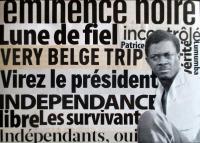 On June 30, 1960, at the ceremony for the proclamation of independence of the Congo, there were three speeches: from King Baudouin of Belgium, the former colonizing power, the President of the Congo, Joseph Kasavubu, and Patrice Lumumba, Prime Minister, the latter in an intervention not foreseen in the initial protocol. It was a short speech of about twelve minutes, written in an accessible and incisive language, performative and visual, a speech that, as the historian Jean Omasombo Tshonda defends, "founds the independent Congo". The first eight minutes are the clearest definition of what colonialism is from the point of view of a continent, a country, a community, a person.
On June 30, 1960, at the ceremony for the proclamation of independence of the Congo, there were three speeches: from King Baudouin of Belgium, the former colonizing power, the President of the Congo, Joseph Kasavubu, and Patrice Lumumba, Prime Minister, the latter in an intervention not foreseen in the initial protocol. It was a short speech of about twelve minutes, written in an accessible and incisive language, performative and visual, a speech that, as the historian Jean Omasombo Tshonda defends, "founds the independent Congo". The first eight minutes are the clearest definition of what colonialism is from the point of view of a continent, a country, a community, a person.
To read
01.02.2021 | by Margarida Calafate Ribeiro
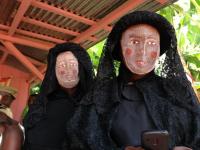 São Tomé and Príncipe, an archipelago on the Equator, boasts one of the most curious performances of popular imagination. Tchiloli is the fruit of cultural (and at times violent) encounters and creolisation. It is a delightful ethnodrama/ethnotheatre that unites music, movements and 16th century texts in one ceremony.
São Tomé and Príncipe, an archipelago on the Equator, boasts one of the most curious performances of popular imagination. Tchiloli is the fruit of cultural (and at times violent) encounters and creolisation. It is a delightful ethnodrama/ethnotheatre that unites music, movements and 16th century texts in one ceremony.
Stages
01.02.2021 | by Marta Lança
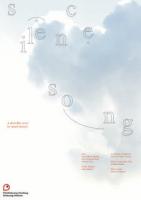 A film is often supposed to be a means of communication, and following this principle, it seems interesting to gather different understandings in order to broaden one’s own vision, and that is precisely what the freedom of an experimental visual production can offer. This act of collecting is all the more interesting as it clusters understandings coming from viewers of different cultures. It is in this sense that the director, who has studied oriental languages - notably Persian - and has a great interest in Japanese culture, fosters the creation of multi-centricities, in this case a German-Nippon-Persian-tricentrism, into which viewers can immerse themselves and come out more enriched.
A film is often supposed to be a means of communication, and following this principle, it seems interesting to gather different understandings in order to broaden one’s own vision, and that is precisely what the freedom of an experimental visual production can offer. This act of collecting is all the more interesting as it clusters understandings coming from viewers of different cultures. It is in this sense that the director, who has studied oriental languages - notably Persian - and has a great interest in Japanese culture, fosters the creation of multi-centricities, in this case a German-Nippon-Persian-tricentrism, into which viewers can immerse themselves and come out more enriched.
Afroscreen
28.01.2021 | by Cheong Kin Man and Mathilde Denison
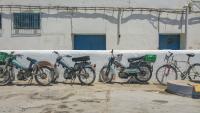 The existing economic trends, and the power of the existing political and economic elites, have been strengthened, and the Tunisian people have yet to reap substantial benefits from their revolution. Tunisia is, ostensibly, now a democracy, but a series of technocratic governments have struggled to bring change, and to balance the interests of the traditional elite and the less privileged general population.
The existing economic trends, and the power of the existing political and economic elites, have been strengthened, and the Tunisian people have yet to reap substantial benefits from their revolution. Tunisia is, ostensibly, now a democracy, but a series of technocratic governments have struggled to bring change, and to balance the interests of the traditional elite and the less privileged general population.
Games Without Borders
07.01.2021 | by Layla Riahi and Hamza Hamouchene
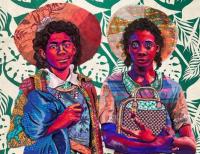 In Bisa's artwork , color is a language that speaks about African American evolution from enslavement in the United States to today's ongoing fight for Black liberation Bisa also draws on her Ghanaian heritage by illustrating the vibrancy of Africa's textile and fabric traditions. These artistic methods allow her to examine several themes including family, community, youth and power.
In Bisa's artwork , color is a language that speaks about African American evolution from enslavement in the United States to today's ongoing fight for Black liberation Bisa also draws on her Ghanaian heritage by illustrating the vibrancy of Africa's textile and fabric traditions. These artistic methods allow her to examine several themes including family, community, youth and power.
Face to face
06.01.2021 | by Ugonna-Ora Owoh
 Guardians put themselves on the line to defend the ideals sacred to democracy. In 2020, they fought on many fronts. When George Floyd was killed in Minneapolis in May, it was proof—if anyone needed it—that Black lives are still not treated as equal in America. In the aftermath of his death, a wave of outrage surged and was harnessed by organizers, both veteran and newly energized, to bring millions to the streets and spotlight the inequities in a world that claims to be far better than it is. The movement for racial justice found its voice in multitudes: a mother in Kenosha delivering her frank report to Joe Biden; a sister in Paris calling for police accountability in her brother’s death. In this extraordinary year, they guarded truth—lived truth.
Guardians put themselves on the line to defend the ideals sacred to democracy. In 2020, they fought on many fronts. When George Floyd was killed in Minneapolis in May, it was proof—if anyone needed it—that Black lives are still not treated as equal in America. In the aftermath of his death, a wave of outrage surged and was harnessed by organizers, both veteran and newly energized, to bring millions to the streets and spotlight the inequities in a world that claims to be far better than it is. The movement for racial justice found its voice in multitudes: a mother in Kenosha delivering her frank report to Joe Biden; a sister in Paris calling for police accountability in her brother’s death. In this extraordinary year, they guarded truth—lived truth.
To read
29.12.2020 | by Justin Worland
 In the face of this new narrative that acknowledges artistic production and an appreciation of it by African communities, how do secular cultural traditions of African countries interact today with artistic training and production, in the case of Afrodescendant artists, who were born and raised in European countries? How do events in the history of Africa and Africans combine with the artistic languages of the "European schools" and, in particular, with contemporary themes?
In the face of this new narrative that acknowledges artistic production and an appreciation of it by African communities, how do secular cultural traditions of African countries interact today with artistic training and production, in the case of Afrodescendant artists, who were born and raised in European countries? How do events in the history of Africa and Africans combine with the artistic languages of the "European schools" and, in particular, with contemporary themes?
To read
28.12.2020 | by António Pinto Ribeiro
 My own difficult experience teaching literature bears this out. Students’ response to every African story is that “the white man stole our culture, we are ashamed of our identity and need to return to our cultures”. But even as they limit colonialism to an exclusively cultural enterprise, they are not able to connect with stories of the past to which they say we should return to.
My own difficult experience teaching literature bears this out. Students’ response to every African story is that “the white man stole our culture, we are ashamed of our identity and need to return to our cultures”. But even as they limit colonialism to an exclusively cultural enterprise, they are not able to connect with stories of the past to which they say we should return to.
To read
22.12.2020 | by Wandia Njoya
 One group that is getting extra attention in this war of propaganda is rappers, as hip hop has long played a central role in the cultural political imagination of Cuba. Last month, Havana rapper Denis Solís was arrested by Cuban police for “insulting an officer.” Soon after, an artist and activist group he belongs to called the San Isidro Movement mobilized an occupation of a public square and went on a hunger strike to demand his release. Videos of the subsequent crackdown by the Cuban authorities went viral, and hundreds came out in the following days to protest the heavy-handed treatment. The protests fizzled out after stalled negotiations with the government, but the damage to the government’s public image had already been done.
One group that is getting extra attention in this war of propaganda is rappers, as hip hop has long played a central role in the cultural political imagination of Cuba. Last month, Havana rapper Denis Solís was arrested by Cuban police for “insulting an officer.” Soon after, an artist and activist group he belongs to called the San Isidro Movement mobilized an occupation of a public square and went on a hunger strike to demand his release. Videos of the subsequent crackdown by the Cuban authorities went viral, and hundreds came out in the following days to protest the heavy-handed treatment. The protests fizzled out after stalled negotiations with the government, but the damage to the government’s public image had already been done.
Games Without Borders
22.12.2020 | by Luna Olavarría Gallegos and Boima Tucker
 Angolans have made themselves in- and outside Angola, in conversation with the world. In the departures and arrivals, they carry with them the intangible and immaterial: intuition, faith, dance, and the sad and deep look of permanent uncertainty. But they also take with them the smile of resistance that can hide sadness and misfortunes. Perhaps at arrivals and departures there isn’t much to say. Perhaps all that is needed is to listen in silence and with a hug. A hug that knows how to listen.
Angolans have made themselves in- and outside Angola, in conversation with the world. In the departures and arrivals, they carry with them the intangible and immaterial: intuition, faith, dance, and the sad and deep look of permanent uncertainty. But they also take with them the smile of resistance that can hide sadness and misfortunes. Perhaps at arrivals and departures there isn’t much to say. Perhaps all that is needed is to listen in silence and with a hug. A hug that knows how to listen.
Afroscreen
21.12.2020 | by André Castro Soares
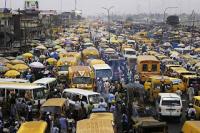 An analysis of territorial occupation of African cities resulting from rapid urbanization should take into account not only the neo-liberal globalization trends but also the recent (and violent) decolonization process. In this sense, a series of rights have been neglected and excluded from African national agendas, with serious implications for the configuration of African cities.
An analysis of territorial occupation of African cities resulting from rapid urbanization should take into account not only the neo-liberal globalization trends but also the recent (and violent) decolonization process. In this sense, a series of rights have been neglected and excluded from African national agendas, with serious implications for the configuration of African cities.
City
18.12.2020 | by Andréia Moassab
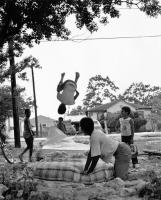 Hudnall records for posterity the architecture of weathered shotgun houses and the vibrant lives within them. He depicts people at ease, celebrating holidays, dressed in their Sunday finery, and kids in the thrall of summertime. “These are the young Floyds coming up,” he says. “They need to be cared for and guided. Rather than holding up a sign and marching for a day or two, then forgetting about it, come here, talk to people, get to know them.”
Hudnall records for posterity the architecture of weathered shotgun houses and the vibrant lives within them. He depicts people at ease, celebrating holidays, dressed in their Sunday finery, and kids in the thrall of summertime. “These are the young Floyds coming up,” he says. “They need to be cared for and guided. Rather than holding up a sign and marching for a day or two, then forgetting about it, come here, talk to people, get to know them.”
Games Without Borders
14.12.2020 | by Earlie Hudnall and Paul Moakley
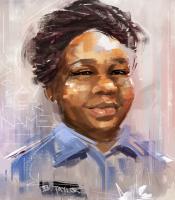 A lot of my pieces are social experiments to say, “What do you feel when you see this human life?” If your first reaction is to say, “They deserved to die because …,” that says a lot about who you are. I hope my art will speak to those people who are so quick to justify the taking of a human life, so that they think: “Wait. This person should still be on this earth. They deserved better.” Up until now, I’ve been creating art and advocating for Black lives from my perspective, of not wanting me to be pulled over and killed by the police.
A lot of my pieces are social experiments to say, “What do you feel when you see this human life?” If your first reaction is to say, “They deserved to die because …,” that says a lot about who you are. I hope my art will speak to those people who are so quick to justify the taking of a human life, so that they think: “Wait. This person should still be on this earth. They deserved better.” Up until now, I’ve been creating art and advocating for Black lives from my perspective, of not wanting me to be pulled over and killed by the police.
Mukanda
14.12.2020 | by Nikkolas Smith